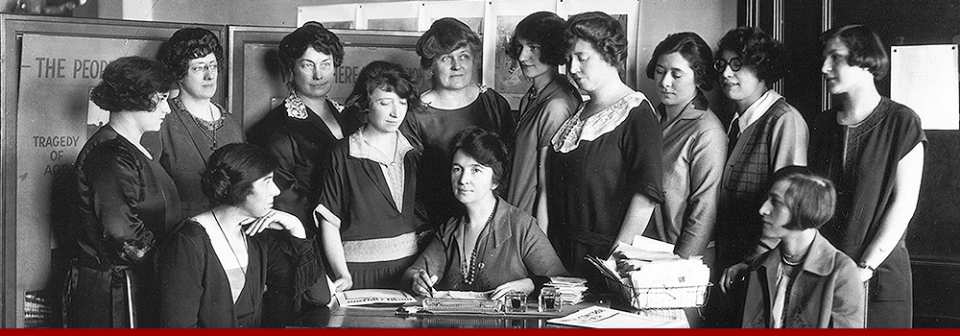Project History and Purpose
The Margaret Sanger Papers Project is a historical editing project sponsored by the Department of History at New York University. The Project was formed by Dr. Esther Katz in 1985 to locate, arrange, edit, research, and publish the papers of the noted birth control pioneer.
There was almost no phase of the birth control movement in which Margaret Sanger did not play a significant role. Schooled in the pre-World War I activism of the radical labor left, and mobilized by her work as a home nurse and midwife in the immigrant ghettos of New York, Sanger became convinced that in liberating women from the tyranny of unwanted pregnancies, birth control would effect fundamental social change. From the publication of The Woman Rebel in 1914 through her leadership of the International Planned Parenthood Federation in the 1950s, Margaret Sanger dedicated herself to making birth control legal, affordable, safe and respectable. The success of Sanger’s crusade for birth control has altered the historical patterns of relations between men and women, contributed to the phenomenal growth of women’s participation in the labor force, and affected the very character of the family– not only in the United States but around the world.
Primary sources and raw data are the foundation on which all research, scholarship and public policy rest. But while the papers of the Founding Fathers and other great men fill the shelves of libraries and historical societies, and are beginning to be made available on-line, those of women, especially such controversial women as Margaret Sanger, remain scattered in both public and private collections. Gaining access to these papers is often a difficult, time-consuming process.
The Papers
The Margaret Sanger Papers Project has published a two-series microfilm edition, the Margaret Sanger Papers Microfilm Edition Smith College Collections and the Collected Documents Series. Work on the Smith College Collections entailed the rearrangement and organization of over 50,000 Sanger documents in the Margaret Sanger collection and seventeen other collections at the Sophia Smith Collection and Smith College Archives. Work on the Collected Documents Series included a ten-year international search of over 1,500 archives and private collections, photocopying material and organizing over 9,000 documents for publication. Both series have been published with a printed reel guide that includes an item-level index by University Publications of America, a division of Lexis-Nexis.
The Book Edition
The Project is currently working on a four-volume book edition of Sanger’s Papers, to be published by the University of Illinois Press.
Volume I (The Woman Rebel, 1900-1928) focuses on the American movement. It chronicles Sanger’s early activist phase: her emergence as a feminist and radical, her commitment to women’s sexual and reproductive autonomy and her early journalistic work for this cause; her involvement in promoting sex education for children and young women; and her efforts in the founding and development of a sometimes contentious birth control movement. This volume was published in 2003.
Volume II (Birth Control Comes of Age, 1928-1939) covers Sanger’s efforts to legalize birth control through the National Committee on Federal Legislation for Birth Control and the 1936 U.S. vs. One Package decision, and substantive material on Sanger’s controversial positions on eugenics, sterilization, race, and immigration. This volume was published in 2007.
Volume III (The Politics of Planned Parenthood, 1939-1966) covers World War II and the post-war years, times in which Sanger focused on the pursuit of her decades-long dream of finding an effective non-barrier method of birth control. At the center of this volume are documents tracing Sanger’s masterful direction of scientists, philanthropists and birth control bureaucrats to combine forces toward the production of the first birth control pill, released widely to the public shortly before her death in 1966. The volume also covers Sanger’s clashes with the new birth control leadership who sought to exploit her reputation and fund-raising expertise while resisting her efforts to lead, and concludes with Sanger’s final years in which she surveyed and evaluated her life and work. This volume was published in 2010.
Volume IV (Around the World for Birth Control, 1920-1960) will be devoted to the most understudied and least understood aspect of Sanger’s career — her international work. From the early 1920s Sanger worked to globalize birth control, promoting the establishment of clinics throughout Europe and Asia. Documents in this volume will cover the historic 1927 World Population Conference (which Sanger organized but in which she was unable to participate because she was a woman) and the creation of the Birth Control International Information Centre in 1929. The volume will conclude with Sanger’s dramatic return to the public stage after World War II as co-president of the International Planned Parenthood Federation, which she helped to found in 1952, and its development until her retirement in 1959.
Margaret Sanger on The Web
Through our web site the Margaret Sanger Papers Project serve a wide audience of students, teachers and policy makers who use our work in a variety of ways. Since the web site’s inception in 1997, we have had over 1 million visitors per year. Many researchers have contacted the Project through its site—biographers and scholars working on monographs reevaluating the birth control movement and its leaders; film makers working on Sanger, birth control and women’s history documentary films; radio and television news producers searching for images and quotes; and reproductive rights groups in several states both to counter attacks on Margaret Sanger and to create histories of Planned Parenthood affiliates. We prepared a guide for high-school students working on National History Day projects, which offers ideas for fitting Sanger into the theme of the current year’s topic and provides a start point for researchers. In the process, we have helped a range of high school students, some of whom have won national prizes for their work.
The Project also published an electronic edition of a small sample of documents related to Sanger’s Woman Rebel and is working on a larger electronic edition of Sanger’s speeches and articles.
